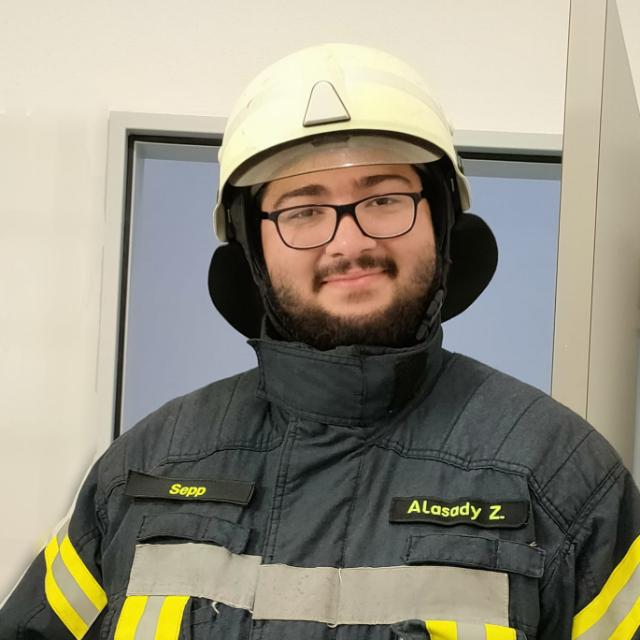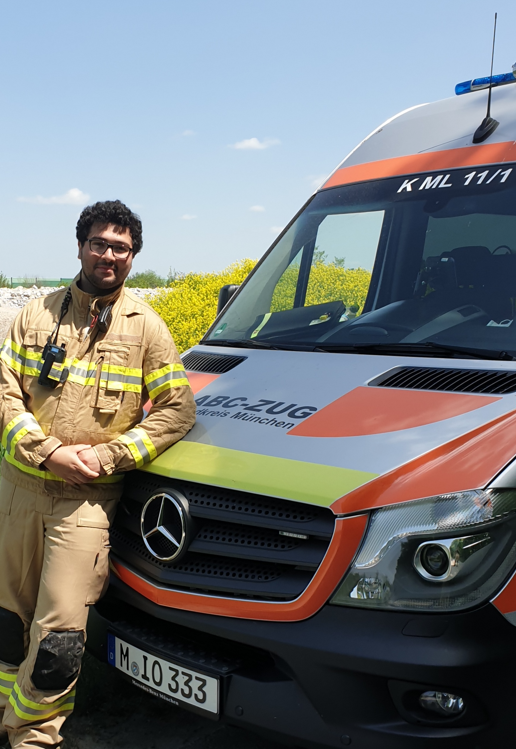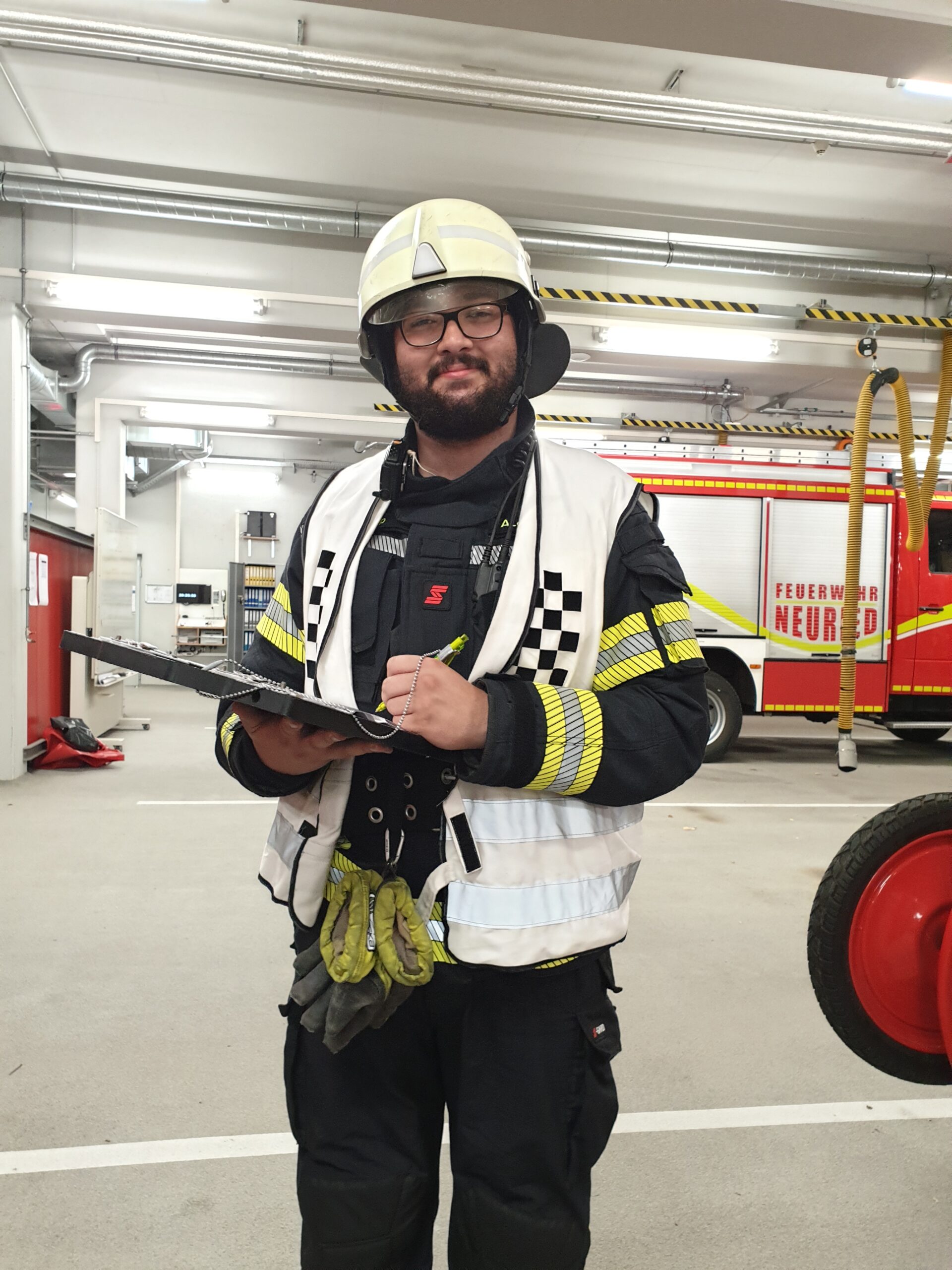19.04.2024 | Interviews
Today in an Interview: Zaid Alasady from Neuried near Munich.
He is 19 years old and has been an active member of the volunteer fire department in his home town for the last five years. Since this year, he has also been involved in the „ABC-Zug München-Land“. We talk to Zaid about how a coincidence turned his life upside down, how his love of chemistry has led to his second volunteer position – and why he also benefits from his knowledge gained from volunteering in everyday life.

Hello Zaid! Let’s start from the beginning: what motivated you to become a volunteer?
I got into volunteering through the fire department. The volunteer fire department in Neuried had organized a discovery day with lots of activities for young people to get to know each other. We were allowed to put on firefighting gear and were able to try our hand at various stations. Back then, we were thrown straight into the world of firefighting – fire hoses, putting out fires and, of course, exploring fire engines. That was pretty cool. After all, many children dream of joining the fire department one day!
How old were you back then?
I was 14 years old when I joined the youth fire department. We learned a lot there through games. For example, there were scavenger hunts with radios through our small town. Or we learned how to use the water-carrying fittings on hot days. From the age of 16, as long as you’ve been there for two years, you’re actually allowed to go out on operations.
Can you still remember your first operation?
I think it was a housewarming party – something very typical. Someone locks themselves out and has left the stove on. Then we arrive and break down the front door to prevent anything worse from happening. I have to admit: That was very exciting! It’s just a completely different world. Suddenly you’re driving a fire engine for the first time! When you arrive at your destination, you are the friend and helper.
In addition to your voluntary work with the volunteer fire department, you also have a second voluntary position. What exactly do you do there?
Exactly, I joined the „ABC-Zug München-Land“ this year. It was because of my great interest in chemistry – chemistry was the subject I was most interested in at school. I already knew the ABC-Zug from the fire department, as we work together with them in the event of any chemical problems. So I thought to myself: just write to them! After that, I went there in person to take a look at the whole thing.
“ABC” sounds so cute at first, but what exactly does it stand for?
“ABC” stands for “nuclear”, “biological” and “chemical” hazards. That may sound dangerous, but at the end of the day, luckily we don’t have that many dangers in Germany. What can happen more frequently, however, is an accident involving a transport vehicle with chemicals, for example. Then we have to be on site and neutralize the chemicals if necessary.
When else is the „ABC-Zug“ needed? 
Another thing I didn’t know at the beginning was that the „ABC-Zug“ is automatically involved in every large-scale fire, for example a building fire – because of the fire gases. These consist of so many different chemicals that the „ABC-Zug“ has to be involved. It supports the fire department and tells them whether the building can be reopened to the public.
What do you enjoy most about your voluntary work?
Firstly, that you really actively help people. You get out of your normal everyday life and slip into the life of a firefighter – and then you’re just there to help other people. On the other hand, the great thing about volunteering is that you can contribute and develop your personal interests and expertise – like I did in the „ABC-Zug“.
And what challenges do you see in your voluntary work?
You have to be prepared for the fact that not everything goes according as planned. Sometimes things can go so wrong that you see things on site with the fire department that you don’t want to see. Think of a traffic accident, for example. You always have to be mentally prepared for that.
What options are there for dealing with such difficult situations?
Volunteering is like a second family. We have what is known as psychosocial emergency care (PSNV) on our side. These are psychologists who are firefighters themselves. And as soon as something really dramatic happens, they are automatically called in. So we have our own specialized experts who provide us with psychological support. We are also actively consulted before an operation. If you don’t want to do something, nobody is forced to do so.
Can you also benefit from the knowledge you have gained through volunteering in your everyday life?
Yes, very much. That was very strongly the case for me because, admittedly, I was a very introverted person before I started volunteering. I rarely helped others and when I got into a tricky situation, I was always overwhelmed. Now that I’ve become something of an expert, I see the world through different eyes and know how to help people. I have the knowledge to make sensible decisions in difficult situations. Volunteering really makes a huge difference to your personality in a positive way.
Is there a specific situation that you can think of?
I remember a situation from last summer: an elderly person can’t cope with the heat and trips and falls – straight onto the asphalt with their head. People’s first reaction is just to look and do nothing. With the knowledge I’ve gained from my voluntary work, I immediately run a different program. I don’t look at what’s happening, but analyze the situation directly. Then actively approach the person and apply the processes I learned. Is the person still responsive? Is he or she bleeding? Is a conversation possible? All of this happens so quickly that you almost don’t notice it. As soon as you start to help the person yourself, other people join in. The biggest problem is always the first step. But thanks to volunteering, you’re constantly in the role of helping anyway. That really makes a huge difference in everyday life.
 What advice would you give to someone who might be hesitant about volunteering?
What advice would you give to someone who might be hesitant about volunteering?
Just have a look – all civil protection and disaster control organizations offer this! Then you can find out on the spot whether it’s something for you. Another option: go for a drink and a meal with the team and ask questions. You can really feel your way around for as long as you like. Until you really feel that you get on really well with the people and that volunteering is the right thing for you.
Do you have specific plans for the future for your voluntary work?
Definitely! At some point, I would like to work at management level, for example as a specialist advisor in the NBC platoon or as a group leader in the fire department. I’m currently doing my respiratory protection training with the fire department. The firefighters with this demanding training are the ones who first go into a burning building. With their equipment and training, they are able to rescue people from the fire.
Did your 14-year-old self expect that you would experience so much with volunteering?
Never in my life, honestly! It was a really big coincidence in my life – and the best one! Because it really turned everything upside down in a positive sense. Looking back, I wouldn’t want to do anything differently. If I were 14 again, I would make the same decision again!